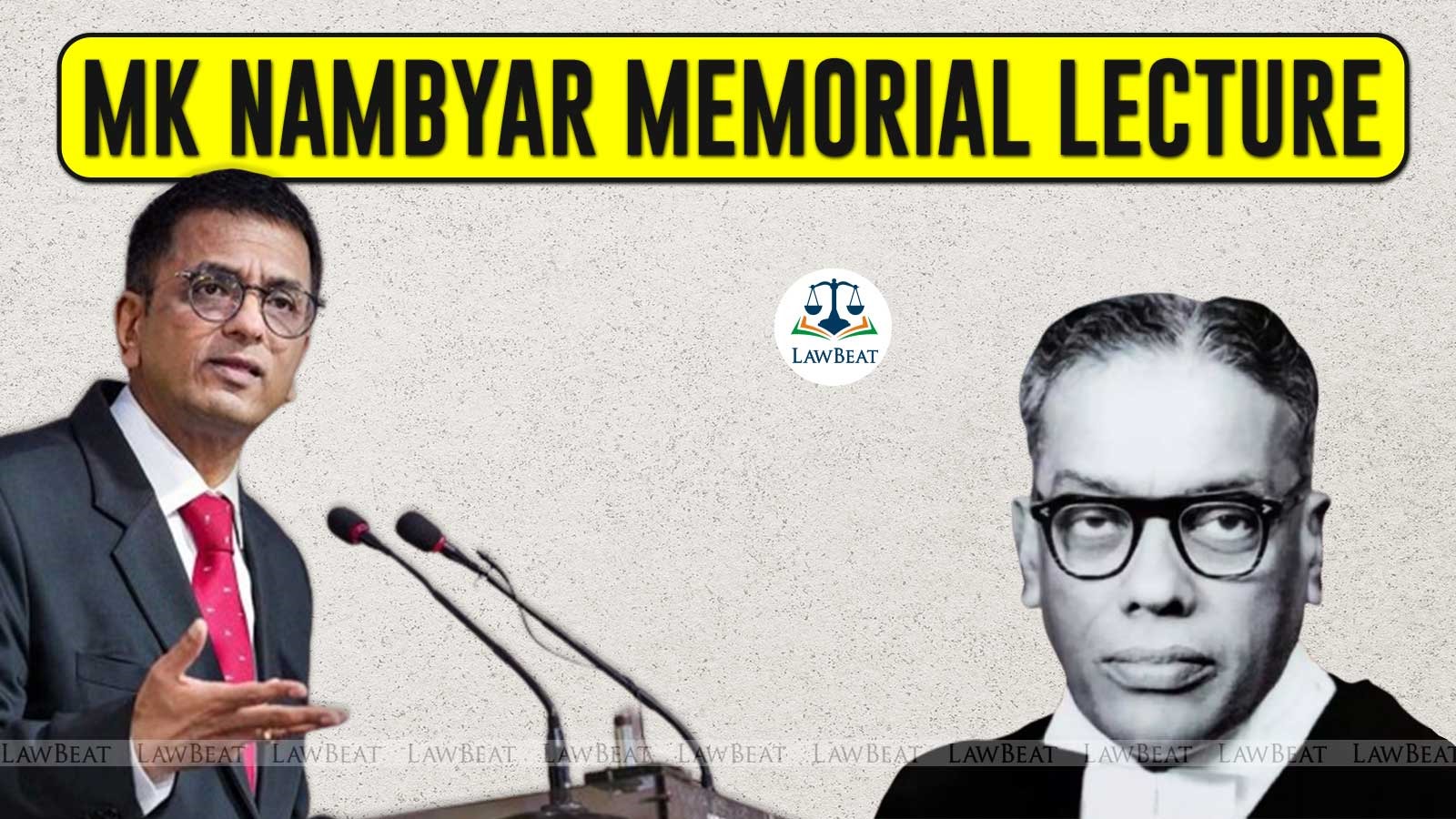Constitution Not Mere Text, It's the Foundation of Democracy: CJI Highlights During MK Nambyar Memorial Lecture

While delivering the M.K. Nambyar Memorial Lecture, the CJI highlighted Nambyar's foresight and his advocacy for the evolution of constitutional provisions with changing times
The Chief Justice of India (CJI) DY Chandrachud on Thursday remarked, "The constitution of a country is more than mere text; it is the foundation of democratic culture," while delivering the MK Nambyar Memorial Lecture in New Delhi. The lecture was on "Foresighted Mr. M K Nambyar – Constitutional Journeys Beyond Original Intent."
The lecture was organized by K.K. Venugopal, the former Attorney General of India and son of M.K. Nambyar, and Senior Advocate Gopal Sankaranarayanan. The CJI shared the stage with K.K. Venugopal, as well as Senior Advocates C.S. Vaidyanathan and Krishnan Venugopal.
In his lecture addressed to the judges and lawyers, the CJI highlighted the dynamic nature of the Indian Constitution, and said, "The Constitution is a constant dialogue between generations of citizens. This dialogue reflects a dynamic process where each era interprets and applies constitutional principles to contemporary challenges and aspirations."
The CJI emphasised that the Constitution must be interpreted in light of its changing social values and said, "The meaning of the Constitution evolves and should be interpreted in light of changing social values. Proponents of this approach argue that the broad language of the Constitution intentionally allows for flexibility and adaptation to future generations. They contend that originalism is overly rigid and ignores the complexities of modern society."
He further argued that the narrow interpretation of 'originalism' was flawed, as it suggested that those who created the Constitution had a specific intended interpretation of the provisions and that they must conform to it.
"Originalism wrongly presumes that the intent of the framers can be precisely ascertained. It presumes that history speaks in one voice and this voice is capable of consistent interpretation by different readers", he added.
He pointed out that an obsession with the 'original intent' of the Constitutional framers goes against the primary vision of it."The Constitution was never meant to be a set of iron-clad rules governing social and legal relations. It was never their intention to lock the provisions of our Constitution in place, for eternity. This would have militated against the necessary flexibility, which is the key to constitutional longevity. "
While referring to the Indian Constitution, the CJI said, "In India, we describe the Constitution as a living instrument for the reason that, while it enunciates eternal values for Indian society, it possesses the resilience necessary to ensure its continued relevance."
He went on to describe how the Indian Constitution was greatly influenced by India's struggle for independence and said, "Unlike the American Constitution, the Indian Constitution was a break from the colonial past and represented the aspirations of a newly independent India. It was deeply influenced by the values stemming from the independence movement and was uniquely Indian."
CJI on Mr Nambyar's Foresightedness
During his address, the CJI quoted the French poet and author Victor Hugo, who said, "Nothing is more powerful than an idea whose time has come." He stated Mr. Nambyar’s interpretation of the Constitution was an exemplar of an idea whose time eventually came.
Speaking of Mr Nambyar's remarkable foresight, the CJI vividly recalled his pivotal role in arguing the very first constitutional case before the Supreme Court of India and later drafting the lead petition in the landmark case of Kesavananda Bharati.
Notably, the CJI further recognized that Nambyar's contributions played a significant role in shaping the interpretation of our Constitution. One of Nambyar’s arguments, which remains relevant even today, was his reading of Articles 14, 19, and 21 together as a collective set of guarantees vested in the individual during the AK Gopalan case.
The arguments put forth by Nambyar reflected his progressive approach to the interpretation of the Constitution that went beyond the rigid confines of "originalism."
